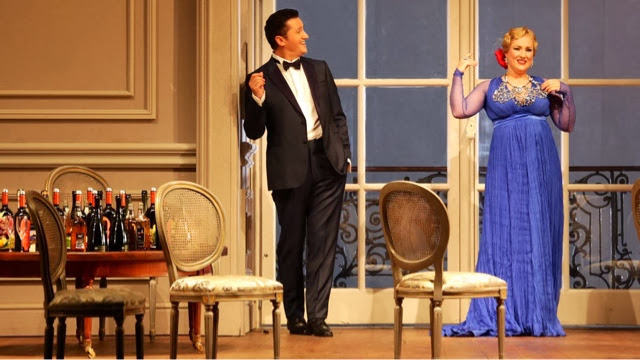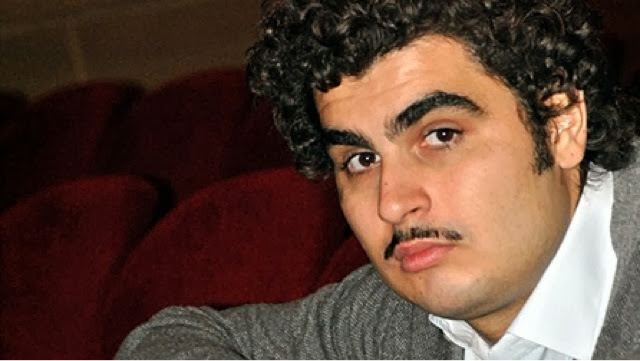The Art of Singing
The Art of Singing Blog is part of the Lively Art of Conversation concerning Opera and Singing. We welcome your participation.
Tuesday, December 17, 2013
To sing
Why no Messiah at The Met?
area that regularly perform the work, and some of them perform it very
well, if not superbly. Add the cost factor and you have a situation where
the public would have to pay a lot more to hear a performance of the
work by the Met vs. other organizations. Also, where are you going to
perform the the work? If at the Met, you would have to have soloists
capable of singing in such a large hall. Further, you need to recognize
that the Messiah is a "nicht" work that attracts a particular audience --
one of a certain size and tastes that would not necessarily be attracted
to a Met performance of it.
What it all comes down to is "Why re-invent the wheel?".
Best from Boston.
Ray Gouin
And more's the pity, because until the last quarter century or so, the Met
regularly offered concerts and works like the Manzoni Requiem as part of
its "repertoire". There was a time when music, voice, vocalism and personality
had a distinct value, divorced from the physical trappings of what we nowadays
politely call "production values".
About fifteen years ago Romophone produced a CD called "An Old Met
Messiah", and another called "An Old Met Christmas". Those who are interested
in vocalism for its sake might try to find them. They reveal a great deal about
what was "right" then and what is "wrong" now.
Bob
Monday, December 16, 2013
Falstaff - Comedy or Tragedy
When I was an undergrad English student, my favorite professor (Sarah Youngblood, God bless her) remarked in passing that in many ways comedy is more profound than
tragedy. At the time, in all my adolescent anxieties, I could not accept that; I couldn’t understand how that could possibly be. But the remark stayed with me, and now that I have stopped mentally shaking my fist at the cosmos, I know it is perfectly true. To me, Midsummer Night’s Dream and The Tempest and Pericles are profounder plays than Othello. But great comedy always seems to be undervalued, not by audiences but by the analytical intelligentsia.
Is the same thing true in opera? Perhaps not. Music seems made to express the wails of grief and anguish and amorous desire more easily than it does the wit and social interaction of comedy. One simply has to look at the repertoire to see how the tragic operas outnumber the comedies. After Mozart, Rossini, Donizetti, how many great comic operas are there? Falstaff, Meistersinger, maybe The Bartered Bride, Gianni Schicchi?
Son
io che vi fa scaltri –
L’arguzia
mia crea l’arguzia degli altri.
am the one who makes them witty –
My
humor creates the humor of the others.
And after that, the magnificent fugue, vivace, Verdi’s great farewell to the stage and to life:
Tutto
nel mondo e burla.
Is Falstaff Verdi’s greatest opera? Perhaps not. Does it matter? Only if you insist on making a competition out of everything. And Falstaff is that invaluable rarity, a comic operatic masterpiece.
POSTSCRIPT: I thought the performances on Saturday were superlative all around. Ambrogio Maestri was obviously born to the role, and he has mastered it. I loved the Carson production in the first act, rich in comic detailing. But the forest scene lacked sufficient magic. The wooden walls were out of place, the stars in the backdrop not enough, there was no quercia, no children . . . . But I was moved to tears of joy anyway, by Verdi’s music. The only thing I hold against Verdi’s comedy is that it has all but obliterated Otto Nicolai’s lesser masterpiece, Die lustigen Weiber von Windsor. Has anyone seen it done?
--
Stephen J. Adams
Department of English
University of Western Ontario
"Nothing that is worth doing can be achieved in our lifetime; therefore we must be saved by hope. Nothing which is true or beautiful or good makes complete sense in any immediate context of history; therefore we must be saved by faith. Nothing we do, however virtuous, can be accomplished alone; therefore we must be saved by love."
Saturday, December 14, 2013
Falstaff
When James Levine returned to the Met in September to conduct Così fan tutte, after two seasons sidelined by illness and injuries, critics and fans alike scrutinized the first performance, seeing in it a bellwether for the remainder of his career. And that performance was more than promising. The supple tempos and iridescent sonorities Mr. Levine coaxed from the pit, the immaculate balances of the vocal ensembles and his sure sense of the architecture of each of the two long acts were all indications of a great conductor in top form.
How, then, to explain the perplexing performance last Friday night of Falstaff, Mr. Levine’s first new production since his return? Nothing went wrong exactly, but nothing went quite right either. Conducting this final masterpiece of Verdi—a Levine specialty at the Met since 1972, his second season with the company—the maestro was off his game.
The problem seems to lie with certain differences in musical style between Così and Falstaff. Even the longer numbers in the Mozart opera, the finales and ensembles, tend to divide into distinct segments so that a changeover of tempo—from andante to allegro, for example—is relatively easy to accomplish: one section stops, everyone catches their breath, and the next section begins.
In the century that divided the premieres of these two operas, the style of transition between sections changed radically. By the time of Falstaff, operas incorporated many more changes of tempo between phrases and even within a single phrase. Conducting became a skill of feeling these subtle gradations of musical velocity and, even more importantly, clearly communicating them via a stream of infinitesimal “nudges” to a large orchestra, soloists and a chorus.
This level of micro control is put to the test in Falstaff. For this sparkling comedy based on Shakespeare’s The Merry Wives of Windsor, Verdi wrote a quicksilver score that, when conducted precisely, feels improvisational. But when the conducting is off even by a hair, the music seems to lurch and halt like a car whose driver is riding the brakes.
And that’s how Mr. Levine’s Falstaff felt: We reached our destination, but the ride was a little rough. This problem was most acute in the tricky second scene of Act 1, in which almost the entire cast is onstage. Where the chattering of the gossiping wives should dovetail smoothly into the angry scheming of Falstaff’s enemies, there was just the tiniest hesitation, a fraction of a second, like the microscopic pause an MP3 player sometimes inserts between tracks.
It seems unlikely the issue was lack of rehearsal time, because Mr. Levine is the company’s music director and it’s his handpicked assistants who do the scheduling. Neither was the issue the cast, which was generally excellent. No, it seems like there was something slightly off in either Mr. Levine’s sense of rhythm or his ability to communicate his interpretation to his performers.
It’s not a fatal error; this was a perfectly respectable Falstaff. It just wasn’t the superb Falstaff the occasion called for. That’s too bad, because the cast was generally terrific, particularly Angela Meade as the leading “wife,” Alice Ford. Her full lyric soprano darted and swooped, with trills and high C’s neatly in place.
Co-conspirators in her scheme to teach the randy old knight Falstaff some manners were soprano Lisette Oropesa, floating endless silvery high notes as daughter Nannetta, and Jennifer Johnson Cano, deploying a crisp mezzo in precise rhythm. Stealing every scene, though, was mezzo Stephanie Blythe as the earthy Dame Quickly, with a massive roar of a mezzo that sounded halfway between a cannon shot and a belly laugh.
The casting of the men was more uneven, with baritone Franco Vassallo (Ford) and debuting tenor Paolo Fanale (Fenton) sounding distant and anonymous. But they threw themselves enthusiastically into the farcical moments of Robert Carsen’s staging, along with the hilarious Keith Jameson and Christian Van Horn as Falstaff’s rebellious sidekicks.
Unlike in many other productions of this opera, the farce here was more condiment than main dish. Mr. Carsen shifted the Elizabethan comedy into the reign of the other Queen Elizabeth, i.e., in post World War II Britain. Falstaff inhabited a luxe hotel room cluttered with room service carts, and the wives did their scheming while sipping martinis in a chic tearoom. For the last scene, the handsome unit set of paneled walls parted to suggest Windsor Forest, with the “supernatural” creatures gliding onstage on wheeled banquet tables amid carbon dioxide fog.
But the star of the show was of course Falstaff himself, Ambrogio Maestri, his huge, warm baritone soaring generously into the auditorium. The jolly giant never clowned but rather played the lecherous knight with exaggerated dignity and self-importance, making the character not only funny but moving as well. When he launched the finale fugue on the text “tutto nel mondo è burla” (“everything in the world is a joke”), you could tell this was a man who was in on the gag.
This Falstaff marks the halfway point in the Met’s schedule of six new productions this season, a potential highlight of which is Borodin’s epic Prince Igor, which will be staged by one of opera’s more controversial figures, Dmitri Tcherniakov, in February. Just last weekend, the busy director took a bow at the Dec. 7 opening night of Milan’s La Scala after his uneven but disturbing take on Verdi’s La Traviata. Thanks to Emerging Pictures’ “Opera in Cinema” film series, New York opera fans could see the entire performance on a 24-hour delay on Sunday at BIG Cinemas Manhattan Theater on the Upper East Side.
Superficially, Mr. Tcherniakov’s approach seemed identical to Mr. Carsen’s: shifting the “period” action of the opera to a late-20th-century setting. Where La Traviata went further was in its hardheaded questioning of the basic sentimentality of its “Lady of the Camellias” love story. Mr. Tcherniakov had the lovers Violetta and Alfredo gradually grow wary and defensive of betrayal to the point that even in their last-minute reconciliation scene, in the opera’s last act, they remained distant, bitter and hopeless.
As Violetta, soprano Diana Damrau created a portrait of an aging, overwrought sex worker,
transforming her first-act aria “Ah fors’ e lui,” from the usual sigh of romantic longing into a disillusioned shrug. In the last act, when the libretto has the heroine in the last stages of tuberculosis, this Violetta exaggerated her symptoms in order to cadge pain medication from a suspicious doctor.
In an even braver performance, tenor Piotr Beczala played up the callow side of her lover Alfredo. Once Violetta betrayed him, he turned utterly cynical, incapable of trust even when he unwillingly returned to his lover’s deathbed. In a macabre dramatic twist, Alfredo stayed at arm’s length from Violetta during their reunion, impatiently glancing as his watch during one of her more extravagant outbursts of despair.
Read more at http://observer.com/2013/12/halftime-at-the-met-james-levine-falters-with-falstaff-but-ambrogio-maestri-is-larger-than-life/#ixzz2nUO1FB5C
Follow us: @newyorkobserver on Twitter | newyorkobserver on Facebook
Friday, December 13, 2013
Thoughts from Kristen, Opera L
I just don’t see many Italian youth interested in opera or many take interest going into classical singing training. Many Italian youth (or some middle aged people) can name every member of Blink 182 or One Direction but most I talked to never even heard of Mirella Freni.(They do seem to recognize Pavarotti though) The so-called Italian tenors we hear often here are light weights (from Sicily, Sardegna - I don't even know if they consider themselves Italians) who sing Fentons and Nemorinos. Vittorio Grigolo, Massimo Giordano -they are not bad but are these the best Italy has to offer nowadays? I had high hopes for Filianoti and I hope he recovers well but he's in and out of the picture due to health reasons.
I am not sure how many Japanese or German audience members who occupy the pricy section of la scala have the patience for your young talent to grow and create their own style while carrying on the tradition - I like the idea but I am not sure if it's realistic -Some might prefer to say I heard some famous so-and-so at la scala and there were booeing and riots and flying radishes.>>
Thursday, December 12, 2013
Thought
Contemporary La Traviata

A scene from Dmitri Tcherniakov’s staging of Verdi’s ‘‘La Traviata,’’ which opened the Teatro alla Scala season on Saturday night in Milan.
By GEORGE LOOMIS
MILAN — When Alfredo, bearing flowers and a gift, arrives at the dying Violetta’s bedroom for a reunion with his lover, he doesn’t immediately rush into her arms. Rather, he pauses timidly — he is slightly fearful of how he will be received. That is one of the many details that lift Dmitri Tcherniakov’s captivating staging of “La Traviata,” which on Saturday initiated a new season at Teatro alla Scala before an audience that included Italy’s president, Giorgio Napolitano, and other representatives of the country’s elite
A Scala opening remains one of Europe’s premier cultural events, but what makes it so isn’t the opening night glitter, but a long commitment to artistry. With “La Traviata,” the house is placating Italian traditionalists by returning to Verdi after having opened last year with Wagner’s “Lohengrin” (2013 is the bicentennial of both composers), and it does so with honor. Mr. Tcherniakov plays down the stuffy moral dimension of “La Traviata” by setting the opera in the present and making the lovers feel contemporary.
First seen looking pensively into a gilded full-length mirror, the celebrated courtesan Violetta — Diana Damrau in superb form — still knows how to throw a great party, but her languorous body language tells you her heart is no longer in it. And so do her surroundings, designed by Mr. Tcherniakov — an elegant but barren green-gray room in which guests, smartly dressed in costumes by Yelena Zaytseva that range from the provocatively casual to black tie, delight in her hospitality.
Only when Alfredo declares that he has loved her for a whole year does Violetta stir with animation. Reverting to party demeanor, Ms. Damrau delivers “Sempre libera” with tonal and technical brilliance, while Annina — more a confidante than a maid in the veteran soprano Mara Zampieri’s portrayal — watches, smoking a cigar.
Violetta finds happiness in the rambling kitchen of the country house she shares with Alfredo, which is as chock full with stuff and warmth as her Paris home is empty. Violetta’s care for Alfredo runs so deep that you can’t believe she would give him up, yielding to his father, Giorgio Germont, who sees their relationship as besmirching family honor.
Despite the logic (thanks to Verdi’s craftsmanship) with which Germont lays out his arguments, they never seem persuasive enough in any production. Mr. Tcherniakov glosses over them, treating the lovers’ rupture more generically. Ms. Damrau turns Violetta’s musically exquisite but elusive comment to Alfredo at the end of Act II that someday he will understand the situation into a scarcely veiled plea that she wants him back, sung on her knees. Just as powerfully, he rejects her.
As cutting-edge theater goes, Mr. Tcherniakov’s staging is relatively mild. His work has often been more controversial. But this did not stop La Scala’s notorious “loggionisti,” inhabitants of the upper galleries, from voicing their displeasure at the final curtain.
Ms. Damrau finds herself in excellent musical company. The sterling tenor Piotr Beczala conveys Alfredo’s unschooled impetuosity while investing Verdi’s vocal lines with the musicianship they deserve. In a performance that builds with fervor, Mr. Beczala makes a fine moment of Alfredo’s often cut cabaletta, prefacing its reprise with an impassioned cadenza and ending the piece with every note in place, sung in proper rhythm and without an interpolated high note.
Mr. Beczala brings a boyish petulance to Alfredo’s denunciation of Violetta before their assembled friends, singing vividly but acting slightly reluctant, as if he knows he shouldn’t be indulging himself like this. Predictably, Mr. Tcherniakov treats the elder Germont as a stiff, moralistic figure, and the baritone Zeljko Lucic obliges by projecting confidence and singing with solid tone.
The conductor Daniele Gatti began the evening by invoking a moment of silence in memory of Nelson Mandela, then presided over a glowing performance characterized by uncommon fidelity to Verdi’s score. The orchestra often surged with passion but also played with telling refinement. Near the end (when Violetta sings “È strano”), Mr. Gatti reverted to Verdi’s original divided string writing (after the 1853 premiere, the composer made changes), although you had to listen carefully to hear it.
More obvious was the pizzicato accompaniment for Alfredo’s aria “De’ miei bollenti spiriti,” which sounded fine, contrary to those who say it is impractical. Mr. Gatti also restored all traditional cuts and repetitions, which paid many dividends, not least in the cabaletta, “Gran Dio! morir sì giovane,” of the Act 3 duet. At this point, the lovers deserve all the extra time together they can muster, and, besides, there is thus better preparation for Violetta’s final moments, rendered so poignantly by Ms. Damrau. But the final, if silent word is left to Annina, who shoos the men out of Violetta’s bedroom, apparently incapable of forgiving them for the suffering they caused Violetta.
La Traviata. Teatro alla Scala, Milan. Through Jan. 4.
Wednesday, December 11, 2013
What causes the Operatic (Classical) Voice to crack?
The instrument, a layer of fright can be added.
even the greatest ones. Pavarotti famously cracked at that Don Carlos in
La Scala, and surely no-one will seriously maintain that he had a bad
technique. I saw bBergonzi at the Met in Andrea Chenier in 1966, and he
cracked on one note, interestingly enough not a high note, one in the
middle register. It happens primarily to men, and especially tenors,
which has to do with the fact that men sing almost completely in chest
voice, which means you need athe right amount of support for the high
notes. So if you give too much pressure, or too little, the tension
(positive tension that is) in the cords springs away, and the balance
between the registers sifts, and the note cracks. Certainly if someone
has a bad technique, it is going to happen a lot more. But it can happen
to the best: maybe just before the high note a cat walked across the
stage and distrated him.
David
Monday, December 09, 2013
Serban Vasile
Verdi's Falstaff, replacing Franco Vassallo, who is ill.
Romanian baritone Vasile's recent appearances with other opera companies
have included Teseu in Enescu's Oedipe at the Bucharest Festival; Enrico in
Donizetti's Lucia di Lammermoor in Circuito Lirico Lombardo's tour of six
Italian cities; and Nireno in Handel's Giulio Cesare with Deutsche Oper am
Rhein.
Baritone
Born 1985
BBC Cardiff Singer of the World competitor
Şerban Vasile was born in Bucharest and graduated from the George Enescu Music High School, Bucharest. He continued his academic studies in the Singing Department of the National University of Music under the guidance of soprano Eleonora Enăchescu, graduating in 2009.
In 2008 Şerban won second prize in the International Singing Competition in Spoleto, Italy. In 2009 he won the Maeştrii Artei Lirice competition in Bucharest and went on to debut as Marcello La bohème in Burgas, Bulgaria.
His success at the 2010 AsLiCo Competition resulted in his debut in the contemporary opera Lupus in fabula by Raffaele Sargenti and the role of Dandini La Cenerentola at AsLiCo and Teatro di Piacenza. Also in 2010, Şerban won second prize in the Salicedoro International Singing Competition.
He has appeared throughout Romania with orchestras including the George Enescu Philharmonic Orchestra and the Orchestra of the National Opera House, Bucharest. Şerban has worked with conductors including Cristian Badea and Ludovic Bács and singers including Alfonso Antoniozzi, Mariella Devia, Eduard Tumagian, Luciana Serra, Nelly Miricioiu, Tiziana Fabbricini and George Crăsnaru.
In July, Şerban appears in Le nozze di Figaro in Como, and will take part in an Opera Domani project taking Nabucco to 20 Italian cities.
Şerban is interested in all aspects of acting and he enjoys travelling.
The Value of Music to Society
Music affects us much as the sense of smell influences us. It speaks directly to the emotional content of our lives, be they physical, sexual, spiritual or indescribable. It is the art the does not require any understanding, explanation, nor analysis. All of these things can add to the art of music but, ultimately, they are little more than rain on the leaves.
Lloyd W. Hanson
lloydwhanson.com<http://
Tom Krause passed
Baritone
Equally successful in the fields of opera, recital, oratorio and recording, Finnish baritone Tom Krause is internationally recognized as one of the greatest vocal artists today.
He is fluent in seven languages: English, German, French, Italian, Spanish, Swedish and Finnish. During a career spanning over fifty roles in the Italian, German, French, English, Finnish, Czech, Russian, and Swedish repertory including the Baroque, Classical, Romantic and Modern, Mr. Krause has performed in most of the great opera houses of the world. He has appeared in leading roles with Milan's La Scala; Teatro Colon, Buenos Aires; Berlin Opera; Vienna State Opera; Munich State Opera; Paris Operas (theatres Garnier and Bastille); Bruxelles Opera Monnaie; Finnish National Opera; Rome Opera; Naples' San Carlo Opera; Barcelona’s Teatro Liceo; Geneva Opera; Metropolitan Opera House; Lyric Opera of Chicago; San Francisco Opera and Houston Grand Opera, as well as with the festivals of Bayreuth, Salzburg, Edinburgh, Glyndebourne, Savonlinna, Tanglewood, etc.
A frequent guest soloist in concert, the baritone has been heard regularly with the Philadelphia Orchestra, New York Philharmonic, Chicago Symphony, Cleveland Orchestra, Boston Symphony, Los Angeles Philharmonic, Montreal Symphony, Berlin Philharmonic, Vienna Philharmonic, Orchestre National de France, Amsterdam Concertgebow, and others.
Mr. Krause has regularly shared the stage and recorded with such great singers as Placido Domingo, Luciano Pavarotti, Jessye Norman, Kiri Te Kanawa, Joan Sutherland, Birgit Nilsson, Marilyn Horne, Margeret Price, Teresa Berganza, and Nicolai Gedda, as well worked under the briliant conductors of our time, including Bernstein, Stravinsky, Solti, Von Karajan, Mehta, Ormandy, Shaw, Osawa, Rostropovich, Eschenbach, Conlon, Salonen, Harnoncourt and Giulini. He has worked with stage directors such as Ponnelle, Strehler, Faggioni, Sellars, Dresen, Everding, Lieberman, Menotti, and Chereau.
In 1963, after having performed the Britten War Requiem conducted by the composer, Benjamin Britten chose Tom Krause to sing the American premiere at the Tanglewood Summer Festival with the Boston Symphony. This led to several concerts in Boston and New York City, in big concert tours throughout the USA and Canada and in 1967, to his debut at the Metropolitan Opera in New York as the count in the Marriage of Figaro in a cast including Cesare Siepi, Mirella Freni, Teresa Berganza and Pilar Lorengar.
In 1968, Mr. Krause was invited by Herbert von Karajan to replace the indisposed Nikolai Ghiarov as Don Giovanni at the Salzburg Music Festival. This led to two further performances of Don Giovanni that summer, three more in 1969, and the role of Guglielmo in a new production of Cosi Fan Tutte with Seiji Ozawa and J.P. Ponnelle that same year. Mr. Krause performed regularly at the Salzburg Music Festival for 20 years, appearing in opera, orchestra concerts and recitals. In 1969, Mr. Krause performed and recorded the Elijah by Mendelssohn with the Philadelphia Orchestra under Eugene Ormandy. Then in 1970 Ormandy chose Krause for the American Premiere of the 13th Symphony by Schostakowitsch and in 1971, Samuel Barber composed The Lovers, the oratorio for baritone solo and choir, for Tom Krause.
A renowned recital artist, he has given countless solo recitals in the most important cities in the U.S.A., Canada, Europe and Japan. He has also appeared in numerous television and feature films.
As one of the most prolific recording artists of our era, he can be heard in over 100 recordings. His works and recordings have awarded him numerous distinctions and prizes during his long career. His recordings of Bach with Munchinger and the Stuttgart Chamber Orchestra were awarded the Bach prize. His recording of Carmen with Marilyn Horne under Leonard Bernstein received a certificate for the best opera recording of 1973 by the National Academy of Recording Arts and Sciences. His recording of the complete Sibelius Songs received the Edison Prize, the Deutsche Schallplatten Prize and the Grammaphone Prize, among others.
During the 1980's, Mr. Krause started giving master classes in the U.S.A. and Europe. From 1989 to 1990 he was guest professor at the Sibelius Academy in Helsinki, and from 1994 to 2001, a full professor at the Music Academy in Hamburg. In 2002, he added a full professorship at the Queen Sofia School of Music, Madrid, Spain, where he chairs the vocal department. In the same year he left the stage of concert and opera. His last important opera appearance was as Moses in Schoenberg’s Moses and Aaron at the Teatro Massimo in Palermo. He had started performing professionally as a popular singer in 1952, his debut as a classical singer was in 1958 with an extremely successful recital in Helsinki.
Because of his enormous experience in all the fields of classical music and his interest in passing on his legacy of great singing, Mr. Krause is in great demand for master classes around the world and is highly regarded as a juror in the most important international singing competitions. He has frequently been head of the Jury or Jury Member at the most prestigious International Singing competitions such as Mobil Song Quest, Auckland; the Queen Sonja International Singing Competition, Oslo; the Mirjam Helin International Singing Competition, Helsinki; Queen Elizabeth Singing Competition, Brussels; the ARD Competition, Munich; the Tschaikowski Singing Competition, Moscow; International Competition of the Art of Lied, Stuttgart; the Singer of the World Competition, Cardiff; the Montreal International Singing Competition, Montreal, Canada; the Moniuszko Competition, Warsaw; etc. Mr. Krause has regularly given master classes at the Academy of Vocal Arts and the Curtis Institute of Music in Philadelphia, PA; the Sibelius Academy, Helsinki; Villecroze Academie Musicale, France; Chapelle Musicale Reine Elisabeth, Brussels; Mozarteum Summer Academy, Salzburg; Encuentro Musical, Santander; the Festival Music Academy, Savonlinna; Voksenåsen Summer Music Academy, Oslo; Kusastsu Music Festival, Kusatsu, Japan; etc. He has also given master classes at the San Francisco Opera, California; the Florida Grand Opera, Miami, Florida; Schleswig-Holstein Festival; the Fifth International Congress of Voice Teachers, Helsinki; Kunitachi School of Music, Tokyo; the Nagoya School of Music, Nagoya; Poland; Portugal, Cairo, Ankara, etc.
In 1990, the Finnish State awarded Mr. Krause with the Order of the Finnish Lion - the highest award for cultural personalities in Finland. He was also given the title Kammersaenger in Hamburg for his achievements there. In recognition of his brilliant artistic contribution to his native Finland, the Helsinki University awarded Mr. Krause the title of Doctor of Music Honoris Causa. Recently he was given the Sibelius medal by the Sibelius Academy, honouring his work in music in Finland and around the world.










